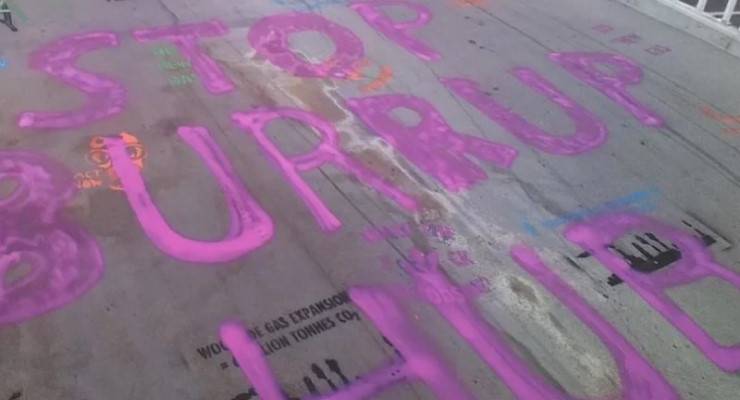
I guess it’s a question of perspective. Some people, including various mining companies and most of our governments, do genuinely consider many environmental activists to be indistinguishable from terrorists. It results from a kind of corporate narcissism: the confusion of self-interest with the public interest.
If you’re in power, as both major parties and some corporate players are accustomed to being, then it’s easy to fall into the trap of thinking that what is good for you is good for the country. Conversely, a threat to your interests is not only un-Australian — it’s dangerous.
It’s this instinct that drives governments to repeatedly try to slide through new laws designed to prevent or deter environmental and other advocates and activists from even speaking out on, let alone engage in non-violent protest against corporate ventures like logging or mining. It is behind the most recent push to make it easier to deregister charities if their members commit even petty offences in the course of protest action.
It is also the reason why NSW Deputy Premier John Barilaro saw nothing inappropriate in the employment of the NSW Police’s fixated persons squad to raid the home of and arrest of a FriendlyJordies producer Kristo Langker over an incident of alleged harassment.
And why, earlier this month, six members of the climate change action group Extinction Rebellion were arrested in their homes by the WA Police’s State Security Investigation Group — that is, the counter-terrorism squad — for graffitiing a pedestrian footbridge near Woodside’s Perth headquarters with washable chalk.
They’ve all been charged with causing damage to property. Their bail conditions include not going within 200 metres of Woodside’s building and not associating with each other. Each has been asked to pay $2,000 to cover repairs.
Repairs? It used to be thought that chalk, being entirely non-permanent, didn’t qualify as graffiti at all and certainly not the subject of a criminal charge. Protesting with chalk is a particularly polite thing to do, given that it can be erased with a garden hose. They won’t even need to hire a high pressure gurney from Kennards.
However, those days are long gone, as two sisters in Sydney, aged two and four, discovered recently when their lockdown activity of drawing with chalk on the driveway of their apartment block led to formal complaints that they were “defacing or damaging” the common property in breach of the by-laws.
In WA, where not many things are considered amusing, graffiti is on the long list of anti-social activities requiring the full force of the law: specifically, the Graffiti Vandalism Act, which imposes a maximum penalty of $24,000 or two years’ imprisonment if you “destroy, damage or deface” property. That includes chalk, and “deface” is wide enough to capture even the most ephemeral disfigurement.
We might as well concede that the ship of free speech, so far as protest activity is concerned, sailed from Australia’s shores a long time ago. It just isn’t a thing that any Australian government is interested in protecting, nor are our courts prepared to stretch very far to help. Chalking up calls to action on the footpath has gone to the same graveyard of public expression as chaining yourself to a tree to save it, or sleeping out in Martin Place to protest inequality.
All criminalised, and upheld as validly so. In the public interest, of course.
However, it’s still a long stretch from accepting that protest action, even non-violent action that causes no actual damage to property, should be made illegal, to being happy for it to be treated as a form of domestic terrorism. Because, make no mistake, that’s where we’re heading.
One of the arrested protestors in Perth, Kelly Hawes, is a PhD student in marine science. She is sincerely concerned about Woodside’s plans to expand its operations in the offshore Scarborough gas field. The graffiti she helped draw was directed to that issue.
Hawes reported that the “cops essentially burst through my door at 7.00am and immediately seized my phone”. Another member said that the police raided his house at 5.00am and spent over two hours searching “everywhere from my underwear drawer, under my bed, my car, everywhere looking for evidence that I had taken part in said heinous crime. My phone was also seized despite me explaining this was essential to my work as a disability support worker.”
No doubt the police were seeking to perfect their case and preserve the evidence; there’s no reason to assume that they weren’t just doing their job with meticulous care. And it’s not for the officers to wonder why they, whose remit is to prevent terrorist acts, were raiding a bunch of environmental protestors over some chalk graffiti.
That question should be directed much higher up, into the reaches of government where personal and public interests have most become blurred.
It’s an increasingly familiar story.








Crikey is committed to hosting lively discussions. Help us keep the conversation useful, interesting and welcoming. We aim to publish comments quickly in the interest of promoting robust conversation, but we’re a small team and we deploy filters to protect against legal risk. Occasionally your comment may be held up while we review, but we’re working as fast as we can to keep the conversation rolling.
The Crikey comment section is members-only content. Please subscribe to leave a comment.
The Crikey comment section is members-only content. Please login to leave a comment.